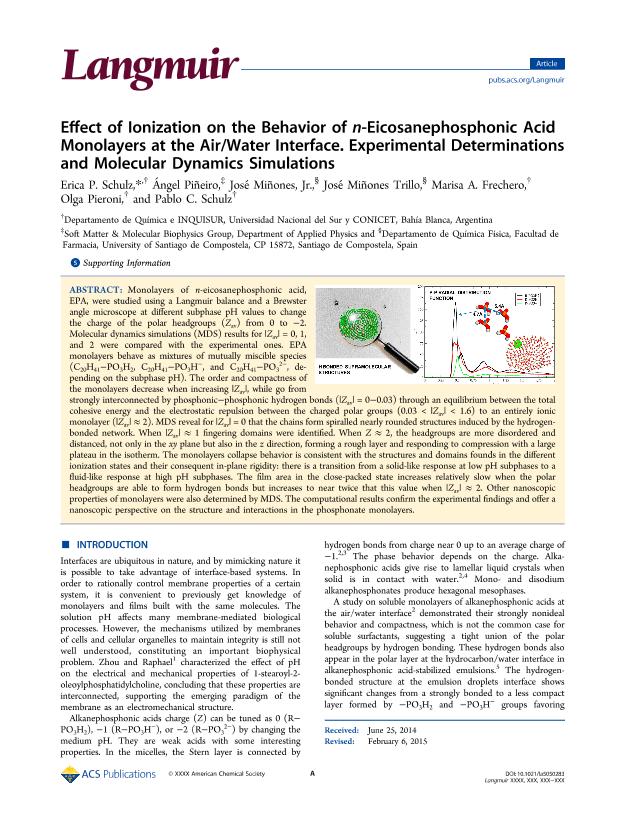Mostrar el registro sencillo del ítem
dc.contributor.author
Schulz, Erica Patricia

dc.contributor.author
Piñeiro, Ángel
dc.contributor.author
Miñones, José
dc.contributor.author
Miñones Trillo, José
dc.contributor.author
Frechero, Marisa Alejandra

dc.contributor.author
Pieroni, Olga Inés

dc.contributor.author
Schulz, Pablo Carlos

dc.date.available
2018-03-23T19:27:31Z
dc.date.issued
2015-03
dc.identifier.citation
Schulz, Erica Patricia; Piñeiro, Ángel; Miñones, José; Miñones Trillo, José; Frechero, Marisa Alejandra; et al.; Effect of ionization on the behavior of n-Eicosanephosphonic acid monolayers at the air/water interface. experimental determinations and molecular dynamics simulations; American Chemical Society; Langmuir; 31; 8; 3-2015; 2269-2280
dc.identifier.issn
0743-7463
dc.identifier.uri
http://hdl.handle.net/11336/39847
dc.description.abstract
Monolayers of n-eicosanephosphonic acid, EPA, were studied using a Langmuir balance and a Brewster angle microscope at different subphase pH values to change the charge of the polar headgroups (Zav) from 0 to -2. Molecular dynamics simulations (MDS) results for |Zav| = 0, 1, and 2 were compared with the experimental ones. EPA monolayers behave as mixtures of mutually miscible species (C20H41-PO3H2, C20H41-PO3H-, and C20H41-PO32-, depending on the subphase pH). The order and compactness of the monolayers decrease when increasing |Zav|, while go from strongly interconnected by phosphonic-phosphonic hydrogen bonds (|Zav| = 0-0.03) through an equilibrium between the total cohesive energy and the electrostatic repulsion between the charged polar groups (0.03 < |Zav| < 1.6) to an entirely ionic monolayer (|Zav| ≈ 2). MDS reveal for |Zav| = 0 that the chains form spiralled nearly rounded structures induced by the hydrogen-bonded network. When |Zav| ≈ 1 fingering domains were identified. When Z ≈ 2, the headgroups are more disordered and distanced, not only in the xy plane but also in the z direction, forming a rough layer and responding to compression with a large plateau in the isotherm. The monolayers collapse behavior is consistent with the structures and domains founds in the different ionization states and their consequent in-plane rigidity: there is a transition from a solid-like response at low pH subphases to a fluid-like response at high pH subphases. The film area in the close-packed state increases relatively slow when the polar headgroups are able to form hydrogen bonds but increases to near twice that this value when |Zav| ≈ 2. Other nanoscopic properties of monolayers were also determined by MDS. The computational results confirm the experimental findings and offer a nanoscopic perspective on the structure and interactions in the phosphonate monolayers.
dc.format
application/pdf
dc.language.iso
eng
dc.publisher
American Chemical Society

dc.rights
info:eu-repo/semantics/openAccess
dc.rights.uri
https://creativecommons.org/licenses/by-nc-sa/2.5/ar/
dc.subject
Ionization
dc.subject
Behavior
dc.subject
Phosphonic Acid
dc.subject
Monolayers
dc.subject.classification
Otras Ciencias Químicas

dc.subject.classification
Ciencias Químicas

dc.subject.classification
CIENCIAS NATURALES Y EXACTAS

dc.title
Effect of ionization on the behavior of n-Eicosanephosphonic acid monolayers at the air/water interface. experimental determinations and molecular dynamics simulations
dc.type
info:eu-repo/semantics/article
dc.type
info:ar-repo/semantics/artículo
dc.type
info:eu-repo/semantics/publishedVersion
dc.date.updated
2018-03-22T13:03:07Z
dc.journal.volume
31
dc.journal.number
8
dc.journal.pagination
2269-2280
dc.journal.pais
Estados Unidos

dc.journal.ciudad
Washington
dc.description.fil
Fil: Schulz, Erica Patricia. Consejo Nacional de Investigaciones Científicas y Técnicas. Centro Científico Tecnológico Conicet - Bahía Blanca. Instituto de Química del Sur. Universidad Nacional del Sur. Departamento de Química. Instituto de Química del Sur; Argentina
dc.description.fil
Fil: Piñeiro, Ángel. Universidad de Santiago de Compostela; España
dc.description.fil
Fil: Miñones, José. Universidad de Santiago de Compostela; España
dc.description.fil
Fil: Miñones Trillo, José. Universidad de Santiago de Compostela; España
dc.description.fil
Fil: Frechero, Marisa Alejandra. Consejo Nacional de Investigaciones Científicas y Técnicas. Centro Científico Tecnológico Conicet - Bahía Blanca. Instituto de Química del Sur. Universidad Nacional del Sur. Departamento de Química. Instituto de Química del Sur; Argentina
dc.description.fil
Fil: Pieroni, Olga Inés. Consejo Nacional de Investigaciones Científicas y Técnicas. Centro Científico Tecnológico Conicet - Bahía Blanca. Instituto de Química del Sur. Universidad Nacional del Sur. Departamento de Química. Instituto de Química del Sur; Argentina
dc.description.fil
Fil: Schulz, Pablo Carlos. Consejo Nacional de Investigaciones Científicas y Técnicas. Centro Científico Tecnológico Conicet - Bahía Blanca. Instituto de Química del Sur. Universidad Nacional del Sur. Departamento de Química. Instituto de Química del Sur; Argentina
dc.journal.title
Langmuir

dc.relation.alternativeid
info:eu-repo/semantics/altIdentifier/doi/http://dx.doi.org/10.1021/la5050283
dc.relation.alternativeid
info:eu-repo/semantics/altIdentifier/url/https://pubs.acs.org/doi/10.1021/la5050283
Archivos asociados
